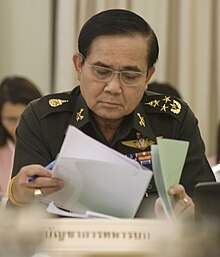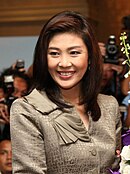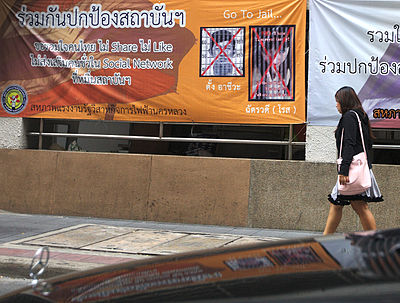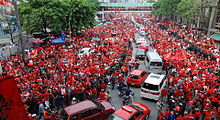2014 Thai coup d'état
After dissolving the government and the Senate of Thailand, the NCPO vested executive and legislative powers in its leader and ordered the judicial branch to operate under its directives.
In addition, it partially repealed the 2007 constitution, save the second chapter that concerned the king,[3] declared martial law and curfew nationwide, banned political gatherings, arrested and detained politicians and anti-coup activists, imposed Internet censorship in Thailand and took control of the media.
[5] In February 2021, government ministers Puttipong Punnakanta, Nataphol Teepsuwan and Thaworn Senniam were found guilty of insurrection during protests that led to the 2014 coup d'état.
Four years later, Thaksin Shinawatra had become the first prime minister of Thailand to complete a full term in office, and his rule is generally agreed to have been one of the most distinctive in the country's modern history.
[11] Similarly, Reuters reported in December 2013 that close friends of Prayut, former army chief, Anupong Paochinda, and General Prawit Wongsuwan were supporters of the PDRC.
He said through a television pool that the imposition of martial law was due to continuous violence from both sides and was for the purpose of allowing the army to restore and maintain the peace.
Charged with the duty to "restore peace to the people from all sides without delay", the POMC was initially given the power to "prevent, suppress, abate and resolve" any situation affecting national security, to enforce every provision of the martial law, and to summon any person.
At the meeting, General Prayut eventually said to Minister of Justice Chaikasem Nitisiri who led the government representatives: "The talk knows no end because you all only speak about the law.
General Prayut then told the meeting that "Sorry, I must seize power"[39][40] and ordered the detention of the cabinet members as well as the leaders of the PDRC, Red Shirts, and political parties who attended the talk, much to the dismay of the media representatives who were present.
[41] On the evening of 22 May 2014, General Prayut announced through a televised address that the armed forces were assuming control of national administration,[42] formally launching a coup d'état against the caretaker government and establishing the NCPO to rule the state.
[43]: 10 In addition, it formally ordered the dissolution of the caretaker government, but the Senate as well as all other state agencies, including the courts and the independent organs, were kept intact.
[50] Immediately after the coup was launched, caretaker Prime Minister Niwatthamrong, who did not attend the talks, left his office at the Ministry of Commerce so as to avoid being apprehended by the military.
[82][83] On the program, several scholars, including Chulalongkorn University lecturer Gothom Arya, were interviewed and gave negative comments on the coup.
[100] The Sydney Morning Herald reported that the military's decisions showed that General Prayut is preparing "a long-term pervasive takeover without the calling of quick elections".
[101] On 29 May 2014, Lieutenant General Chatchalerm Chalermsukh, deputy army chief of staff, told reporters at a press conference in Bangkok, that while elections would be held, there was no timetable.
[105] On that day, the NCPO searched the residence of Somyot Prueksakasemsuk, an imprisoned magazine editor sentenced in 2013 to 11 years in jail for lèse majesté.
The NCPO detained his wife, who had been campaigning for political prisoners, and his son, a fourth year student at the Faculty of Law, Thammasat University.
[107] The NCPO later summoned a number of exiled activists accused of lèse majesté, including former Chulalongkorn University political science lecturer Giles Ji Ungpakorn and former minister Jakrapob Penkair.
[110] Wissanu Krea-ngam, a Chulalongkorn University law lecturer who drafted the interim constitution, explained that the requirement was deleted to avoid "lengthy process".
[121] Under the proposed constitution, Parliament is bicameral, consisting of a 250-member nominated Senate and a 500-member House of Representatives of whom 350 are elected from single-member constituencies, and 150 members from party lists.
[120] The proposed constitution also allows the NCPO to appoint an eight to ten person panel who will choose Senators,[122] to include six seats reserved for the heads of the Royal Thai Army, Navy, Air Force, and Police, plus the military's supreme commander, and defense permanent secretary.
[123] Phra Buddha Issara, a then Buddhist monk and PDRC co-leader, went on stage to proclaim the victory of the anti-Shinawatra government protesters before requesting that his followers disperse and go home.
[127] In spite of a ban on political gatherings of more than five persons,[128] demonstrators, including Thammasat University students, marched to the Democracy Monument on 23 May 2014 to express their anger at the coup.
[130] On the same day, separate protests took place outside the Bangkok Art and Culture Centre, led by freelance media, artists, and social activists.
In Chiang Mai Province, a group of people clad in black held anti-coup activities for days, including marching to the city's ancient walls where they performed a candle-lit ceremony opposing the military's action.
[171] The coup met with strong reactions from Thai academics, with the majority expressing serious concern over its negative impact on Thailand's democracy and human rights.
[172] A group of university lecturers, who call themselves the Assembly for the Defence of Democracy (AFDD), issued a statement on 23 May 2014, emphasizing the right of the people to offer resistance to an illegitimate ruler and requesting the military to promptly release the detained protesters.
Eventually, there will be no one left to be ruled.On that day, AFDD members gathered in front of the Dome Building of Thammasat University to express their anti-coup stance.
[182] One of the targets was Pavin Chachavalpongpun, a Thai associate professor at Kyoto University who challenged the summons by asking if he could send his pet chihuahua to meet with General Prayut in his stead.
Rights groups said employers in southern Thailand had also advised their foreign workers to go into hiding in the woods or rubber plantations to avoid arrest.






